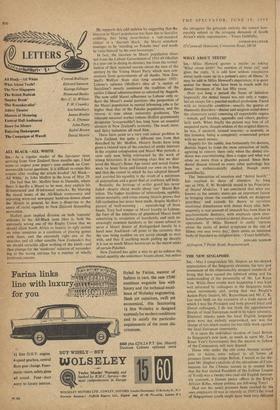All Black—All White Conrad Bollinger What About Teeth? Edward Samson
The New Singapore George Edinger The British Radical- Desmond Banks `Sunday Break' Rev. C. G. Wilson `Der Rosenkavalier' P. H. Crumley Abbey Theatre Ian Sainsbury Matters of Motoring James Bredin Festival Hall Audiencei C. A. Thomas Straw for Silence John Parry Enjoying Shakespeare Isabel Brown The Campaigns of Wavell David Morris
ALL BLACK—ALL WHITE
SIR,—As a regular reader of the Spectator since arriving from New Zealand three months ago, I had come to respect your paper's sane outlook on Com- monwealth racial questions. It is difficult to retain this respect after reading the article headed. 'All Black— All White,' by John Moffett in the issue of May 29.
The fact that Mr. Moffett lives in Dunedin, where ithere is hardly a Maori to be seen, may explain his ill-humoured and ill-informed remarks. By blurring %he moral issues of the All-Black controversy and repeating worn-out newspaper hand-me-downs about the Maoris in general, he does a disservice to the cause of racial equality in New Zealand demanding correction.
Moffett ,casts implied derision on both 'extreme' attitudes to the All-Black issue (that is, both the extremely wrong one of the Rugby ,Union that we should allow South Africa to impose its ugly racism on other countries as a condition of playing games with them, and the extremely right one of the churches and all other sensible New Zealanders that we should certainly allow nothing of the kind)—and then plumps for the 'moderate' solution of surrender- ing to the wrong extreme for a number of wholly irrelevant reasons. He supports this odd opinion by suggesting that the increase in Maori population has been due to Socialist coddling, that being nevertheless a 'sub-standard citizen' in a 'decrepit shack,' the Maori somehow manages to be 'standing on Pakeha toes' and needs to 'raise himself by his own bootstraps.'
In fact, the increase in Maori population dates not from the Labour Government of 1935-49 (Moffett is a year out in dating its demise), but from the revital- isation of their national morale about the turn of the century by the Young Maori Party which won con- cessions from governments of all shades. New Zea- land's Welfare State also long antedates 1935: Labour's reforms (Moffett's idea of 'a surfeit of Socialism') merely continued the tradition of the earlier Liberal administration so admired by Asquith. The now solid Maori adherence to Labour only re- flects the Maori's social position—the proportion of the Maori population in menial labouring jobs is far higher than that of the Pakeha population, and the reverse is true about university graduates. The itinerant seasonal worker (whom Moffett gratuitously designates 'irresponsible') has long been an essential element in Ncw Zealand's economy. The wool, meat, and dairy industries all need him.
These facts point to a very real colour problem in New Zealand, but quite a different one from that described by Mr. Moffett. History books have long given a twisted view of the conduct of settler interests in the original colonisation and Maori War periods, a view only now being overturned by the work of young historians. It is becoming clear that we shat- tered the Maori's Stone Age social and moral frame- work by brute force and foisted our own on to him. and that the extent to which he has adapted himself and asserted his equality is the result of a minimum of paternalism and a great deal of stubborn self-help.
Basically, the heritage of settler greed has never faded—despite cheap words about 'our' Maori Bat- talion. The higher incidence of tuberculosis, syphilis, infant mortality, and crime among Maoris proves that full restitution has never been made, despite Moffett's picture of 'well-meaning . . . squandering' of State funds. Tory bad temper at Maori loyalty to Labour, the fury of the inheritors of plundered Maori lands submitting to revalution of leaseholds, and such in- creasingly common incidents as the recent refusal to serve a Maori doctor of distinguished family in a hotel near Auckland—all point to the certainty that the toes being trodden on are corny enough to start with, and that if anything needs pulling up sharply it is not so much Maori bootstraps as the moral socks of certain Pakehas.
New Zealand has quite a way to go to achieve the racial equality she sometimes boasts about, but unless she abrogates the principle entirely she cannot hon- ourably submit to the arrogant demands of South Africa's white supremacists.—Yours faithfully,
CONRAD BOLLINOER






































 Previous page
Previous page